3 March, 2022 | Publication, Resource and waste management
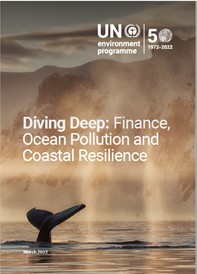
A key constraint to improving waste and resource management in many countries is a lack of access to investment finance. Extending waste collection to all and phasing out uncontrolled dumping and open burning in low-income countries would significantly cut the mass of plastics reaching the ocean. So the UNEP Finance Initiative publication Diving Deep, aimed at banks, insurers and institutional investors, is very welcome. Guidance is provided in the form of a science-based, actionable toolkit, to ensure that their investments, both in product manufacture and in waste management, encourage waste prevention and sound waste management, thus keeping plastics out of the oceans.
The promotional video and the document itself are worth looking at just for the wonderful images by world-renowned photographer Cristina Mittermeier of Sea Legacy. The guidance was prepared by WWF (led by Paula Chin) and RWA (led by Andy Whiteman). DCW played a small role as one of the reviewers.
16 September, 2021 | Publication, Resource and waste management
Professor David C Wilson is pleased to co-author an important new publication The Nine Development Bands: A conceptual framework and global theory of waste and development. The open access paper in ISWA’s peer-reviewed journal Waste Management & Research can be downloaded freely. The ‘9 DBs’ builds on the integrated sustainable waste management (ISWM) analytical framework to help characterise waste and resources management (WaRM) systems in cities and countries. Based on over 100 years of combined experience of the authors (Andrew Whiteman, Mike Webster and DCW), the 9DBs is a powerful addition to the waste management practitioner’s toolkit, bringing depth and nuance to understanding of WaRM systems globally.
The early DBs reflect stepwise improvement towards the new
baseline of meeting the SDG 11.6.1 indicators of universal collection and
management in controlled facilities (DB5); while later DBs represent two
prevailing routes to move towards environmentally sound management (ESM) and
the 3Rs (Reduce, Reuse, Recycle). An aspirational DB Zero, a real circular
economy, sits above all 9 DBs, accessible via multiple pathways, posing an
ultimate challenge for development practice. The 9DBs contextualise the
challenge of meeting the waste-related SDGs, in particular for developing
countries striving towards SDG 11.6.1 but also for all countries aspiring to a
circular economy. Whether you are a practitioner, decision-maker, service
provider, or sector activist, the 9DBs will help you to identify the key
pressure points for catalysing change, and focus your time and resources on
achieving maximum impact.
19 December, 2018 | Publication, Resource and waste management
Professor David C. Wilson’s final contribution to the CIWM Journal took the form of an interview in which he looked back on his Presidential year. This web-posting also includes an index of and links to his monthly columns for the CIWM journal, many of which were ‘think-pieces’ on issues in which he has been involved for years or even decades. Among the questions covered in the final interview were: has any topic dominated the year (yes, plastics – both marine plastics and the ‘China ban’); and what would be your advice to Enda Kiernan and future CIWM Presidents (‘Be true to yourself’ – which the editor also used as this month’s headline).
https://www.babyscanclinic.com/blog/order-generic-levitra/
Interviews and DCW’s theme for the year:
- Dec 2018: ‘Be true to yourself’. DCW looks back on his year as president. PDF attached at end of post.
- Dec 2017: A key utility service. DCW revisited his Presidential address to further explain his key themes for the year ahead. The overarching theme was to have solid waste management recognised as an essential utility service.
- Nov 2017: One small step. The editor Ben Wood introduced DCW, his story in waste and his hopes for his Presidential year. PDF attached at end of post.
Plastics:
- Oct 2018: Plastics – diabolic or fantastic? How to respond to the crisis of plastics entering our oceans? Which plastic uses are diabolic and which fantastic?
- Jun 2018: How to influence people. DCW reported on CIWM’s role in influencing the UK’s initiative on marine plastics which was announced at the Commonwealth Heads of Government Meeting in London in April 2018.
- Apr 2018: China – coming full circle. In the wake of the current China-induced recycling crisis in the West, DCW gave his personal perspective on China’s journey in waste management and recycling over the last 30-40 years and moving forward…
- Feb 2018: Turning the tide. Where do plastics entering the ocean come from, and how do we turn the tide?
Promoting waste reduction and recycling:
- Sep 2018: Charge! DCW reflected on the challenges of devising the right policies to charge households for solid waste management services
- May 2018: Revaluing recycling. DCW argued that we need to rethink recycling if it is to become sustainable and proposed a framework for doing so, by considering the embodied social, environmental and technical values alongside the market price.
- Jan 2018: Inspiring reuse. DCW showcased the five inspiring projects shortlisted for Best Reuse or Waste Prevention Project at the CIWM Sustainability and Resource Awards 2017.
Waste and climate
- Jul 2018: Don’t waste our climate. DCW made the case for resource and waste management as an entry point to achieve significant climate mitigation. The article was subsequently re-published by the National Solid Waste Association of India (NSWAI) in their member journal Waste Monitor in July 2019.
- Website May 2018: Uncontrolled burning of solid waste as a significant contributor to climate change. DCW reported on current research at Imperial College London.
Tackling the global waste crisis
- Website Nov 2018: DCW awards his Presidential Medal to Mike Webster, Founder and CEO of the charity Wasteaid.
- Website Oct 2018: Tackling the global waste crisis through community waste management. DCW reported on two papers in the peer-reviewed literature, which follow-up on the CIWM-Waste aid toolkit Making Waste Work.
- Dec 2017: A key utility service. A key theme for DCW’s Presidential year was to highlight the global waste crisis, the 3 billion people who lack access to basic SWM services.
- Website Nov 2017: DCW launches toolkit for community waste management. Introducing DCW’s Presidential Report, the CIWM-Wasteaid Toolkit Making Waste Work. The Toolkit includes a dozen How-to-do-it Guides to enable local entrepreneurs to implement simple technologies using organics and low-value plastics in the waste.
Other DCW areas of interest or ‘hobby horses’:
- Aug 2018: Hazardous waste – plus ça change. DCW reflected on 40 years of involvement with hazardous waste policy, and concluded that the current and future challenges identified by CIWM’s Hazardous Waste Special Interest Group have changed relatively little over the years.
- Mar 2018: Let’s skip “the tip”. DCW argued that terms such as “the tip”, “rubbish”, “refuse” and arguably “tipping”, have no place in the vocabulary of the professional waste and resource manager.
14 November, 2018 | Awards, Resource and waste management
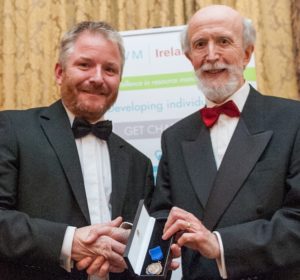
DCW hands over his CIWM Presidential Medal for 2018 to Mike Webster
https://www.babyscanclinic.com/blog/buy-cialis-tadalafil-online-20-mg/
At the CIWM Presidential Dinner at the Intercontinental Hotel in Dublin, after the inauguration of Enda Kiernan as the next President, DCW’s last act as the retiring President was to award his CIWM Presidential Medal for 2018. The recipient was Mike Webster, the founder and CEO of the new charity Wasteaid, which is working directly with local communities in some of the least developed countries to tackle the global waste crisis. The text of DCW’s speech is reproduced below.
‘Being able to award the President’s Medal is one of the perks of being President, and indeed the only thing that is expected of you after you hand over the chain…. The standard advice is to give it to someone who has particularly helped in my career or in my Presidential year.
I started out in 1974, so my early influencers are now either quite old or have already moved on to the great Circular Economy in the sky.
Looking back on my career, one of the aspects I take most pride in is the number of (then) young people whom I have either brought into the resource and waste sector, or to whose development I have made some contribution; and who I hope won’t be offended if I refer to them, tongue in cheek as, at least in part, my “protégées”.
I am also aware that, in the twilight of my own career, I am leaving behind much unfinished business. So, my thoughts here have gone to one of those protégées, whom I believe can take forward, and make a difference in, an area that is close to my heart. I devoted at least 20 years of my life to working with international organisations, national governments and large cities to develop integrated and sustainable waste management systems.
I have recently drawn attention to the global waste crisis, the more than 3 billion people worldwide who still lack access to basic solid waste management services, which reinforces the comparative failure of such top down approaches; yes, we have made some progress, but it is painfully slow, and corruption often impedes progress. So, I have come to the realisation that, in parallel, we also need to work from the bottom up.
This person is already making an impact, by opening-up opportunities for you and me, as individual resource and waste management professionals and as companies, to get involved and to make a real difference by helping local communities in some of the poorest countries to help themselves by making products to sell locally from the low value organics and plastics in the waste – thus helping to solve their local waste problems, keeping plastics out of the oceans AND giving themselves sustainable livelihoods to feed and educate their families.
This person has done this at considerable personal sacrifice, giving up a secure job to set up a new charity, initially drawing little or no salary while their children were still very young. The charity is now taking off, helped in part by the success of the CIWM-sponsored Toolkit; income has doubled this year, and looks set to triple that figure next year to more than a quarter of a million pounds.
The winner the 2018 CIWM President’s medal is Mike Webster, the Founder and CEO of our sector’s very own charity, Wasteaid.’
14 November, 2018 | Awards, Resource and waste management
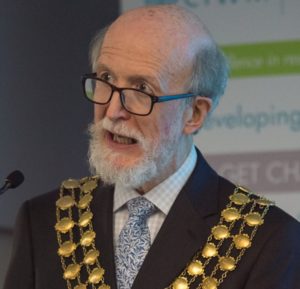
DCW gives his final speech as CIWM President
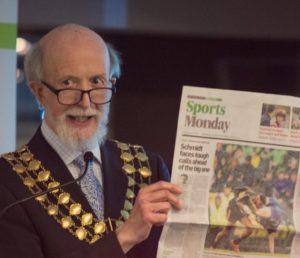
The Gaelic Football team which Enda Kiernan manages appeared in the lead photo story of the previous day’s Irish Times
Professor David C Wilson handed over the Presidency of CIWM, the UK and Irish professional body for resources and waste, to Enda Kiernan at the Aviva Stadium in Dublin on 13 November 2018. He highlighted plastics – both plastics entering the oceans and China’s ban on imports for recycling – as the dominant topic in his Presidential year. The public focus on marine plastics also helped dissemination of his Presidential report, the CIWM-Wasteaid Toolkit Making Waste Work; the website clocked 56,000 visits in its first year, with 7,000 downloads. DCW introduced his fellow Irishman, Enda Kiernan of Cork County Council as the next President. CIWM waited more than a century for its first Irish President; now we have had three in five years, and two in a row, although Enda is the first from the Republic of Ireland.
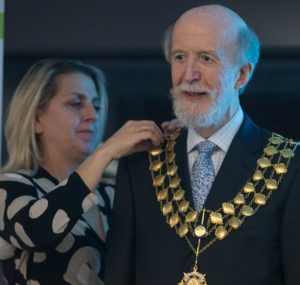
The chain of office is removed from DCW to pass over to Enda Kiernan
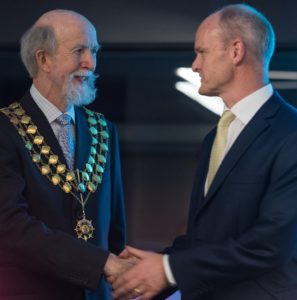
DCW congratulates Enda Kiernan on becoming the 103rd President of CIWM
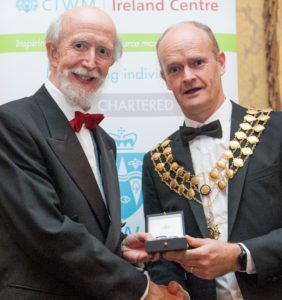
Enda Kiernan presents DCW with his Past President’s medal






